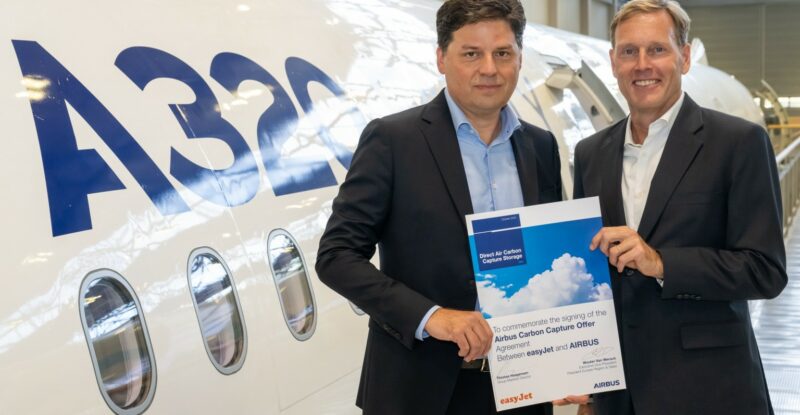 European budget carrier easyJet has firmed up an agreement with Airbus to purchase carbon-removal credits through the airframer’s Direct Air Carbon Capture and Storage (DACCS) initiative.
European budget carrier easyJet has firmed up an agreement with Airbus to purchase carbon-removal credits through the airframer’s Direct Air Carbon Capture and Storage (DACCS) initiative.
It follows a letter of intent signed with Airbus by easyJet and several other airlines during last year’s Farnborough Airshow, in which the carriers agreed to explore opportunities to pre-purchase carbon-removal credits from DACCS technology. Other tentative signatories included Air Canada, Air France-KLM, IAG, LATAM, Lufthansa Group and Virgin Atlantic.
Airbus announced on 9 October that easyJet has signed a formal contract to purchase carbon-removal credits, which will be issued by 1PointFive between 2026 and 2029. Airbus’ agreement with 1PointFive covers the pre-purchase of 400,000 tonnes of carbon-removal credits, to be delivered over the four-year period.
EasyJet has not disclosed how many credits it has agreed to buy, noting that details of the pact are “confidential”.
1PointFive is a subsidiary of energy firm Occidental and Carbon Engineering — a Canadian company that specializes in removing carbon dioxide from the atmosphere and storing it underground. Airbus disclosed in November that it was investing millions of Canadian dollars in Carbon Engineering, to help fund the Squamish, British Columbia-based company’s research and development on DAC.
Carbon Engineering and 1PointFive are building a DAC plant in Texas known as Stratos, which is expected to become operational in mid-2025. The two companies envision a scenario in which 70 DAC plants could come online by 2035, each with the capacity to remove one million tons of CO2 from the atmosphere.
Japanese carrier All Nippon Airways (ANA) announced earlier this year that it had become the first airline in the world to sign a purchase agreement with 1PointFive for carbon-removal credits enabled by direct air capture. ANA has agreed to purchase 10,000 metric tonnes of carbon-removal credits a year for three years, beginning in 2025.
The airline industry is billing carbon capture as one part of a basket of measures aimed at decarbonizing the sector.
EasyJet says its recent decision to purchase carbon-removal credits complements its wider decarbonization strategy.
“Decarbonizing a hard-to-abate sector such as aviation is a huge challenge and we believe carbon removal will play an important role in addressing our residual emissions in the future, complementing other components to help us achieve our pathway to net zero,” says easyJet group markets director Thomas Haagensen.
“Our ultimate aim is to achieve zero carbon emission flying and, as well as investing into important projects like direct air carbon capture technology, we are working with multiple partners — including Airbus — to accelerate the development of zero carbon emission aircraft technology.”
Airbus is also keen to emphasize that DAC technology should be used in addition to, not instead of other carbon-reduction solutions such as sustainable aviation fuel (SAF) and the development of hydrogen-powered aircraft.
When the International Air Transport Association (IATA) committed in October 2021 to the airline industry achieving net zero by 2050, it set out a vision under which carbon offsetting and carbon capture would account for 19% of the abatement. The lion’s share — 65% — would come from SAF, under IATA’s vision, with 13% coming from new technology electric- and hydrogen-powered aircraft, and 3% from infrastructure and operational efficiencies.
On the latter point, associations representing the European aviation sector signed a Joint Industry Declaration on 10 October, in which they agreed to work together “to make Europe the most efficient and environmentally friendly sky to fly in the world”.
The industry bodies, which include ACI Europe, Airlines For Europe, the Civil Air Navigation Services Organisation (CANSO) and IATA, say their first step will be to work together to update the European Union’s air traffic management (ATM) master plan — the common roadmap for the EU’s Single European Sky ATM Research (SESAR) program.
Related Articles:
- Aviation industry starts to pour money into carbon-removal tech
- Airbus works with ZeroAvia to help make hydrogen flights take off
- Eurocontrol pours cold water on decarbonizing long-haul flights
- CO2 sucked from the air and turned into jet fuel shows promise
Featured image credited to Airbus














